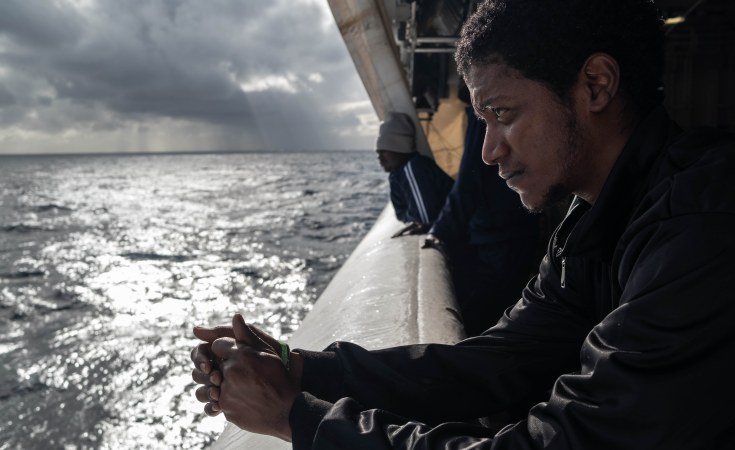With people on the move globally at "unprecedented" levels, the UN's new migration agency chief insisted on Monday that rather than being a problem, host countries should recognize that migrants are what their economies most need to thrive.
Speaking to reporters in Geneva on her first official day as head of the International Organization for Migration (IOM), Amy Pope said that migrants were "people first" who should not be seen as a problem.
That distinction was more critical than ever today, the IOM Director-General added, noting that it is almost 10 years since a migrant shipwreck off the Italian coastline on 3 October 2013 claimed more than 368 lives. It was the agency's biggest fear that such tragedies "have been normalized", Ms. Pope said.
"These are people first before we label them as migrants or asylum seekers or anything else, and valuing their human life, recognizing their dignity is key to everything we say and do and whichever Member State we work with," Ms. Pope said.
"Especially as we are reaching the anniversary of Lampedusa, it's an important moment to recognize and recall that ultimately this isn't about a problem, this is about people."
Recurring vulnerabilities
Migration was not about to end any time soon, Ms. Pope continued, given the huge impact of climate shocks, conflict, persecution and other destabilizing influences on fragile communities around the world, from Latin America to Europe, Asia and Africa. There are some 280 million migrants worldwide.
"We know already that there have been tens of millions of people who are on the move just this year as a result of climate impact. There are hundreds of millions more who live in extremely climate vulnerable communities," she said.
Because of this dramatic status quo endured by so many individuals, the IOM Director-General insisted that unless wealthier nations helped them to withstand drought and other climate shocks, while also embracing the opportunities offered by migration, it was very likely that the world would see more "desperate people" on the move.
AI limitations
"Whether it's climate change, whether it's conflict, whether it's the inability to find a job or a future at home, or violence within neighbourhoods or communities, more and more people are looking to find a better life somewhere else in the world."
Asked whether US President Joe Biden's decision last month to allow some 470,000 unregistered Venezuelans to work legally might encourage migration, the IOM chief responded that if there weren't jobs, "they wouldn't come".
Get real
The UN migration agency's goal was therefore to call for more "regular, realistic pathways for people", Ms. Pope said, before highlighting the findings of a World Bank report that underscored how migration was a "powerful force" for poverty reduction.
Today, no less than 30 of the world's biggest economies struggle to fill posts in healthcare, agriculture, construction, hospitality, "you name it", the IOM chief said. "Frankly, while there have been tremendous developments in artificial intelligence, it does not move at the pace to remedy those labour shortages. And many, many of those jobs will not be done well by a machine."
Spanish model
Noting how the Spanish Government had embraced the labour solutions offered by migration, Ms. Pope insisted that economies that had seen a significant influx of migrants over the years had seen "overwhelmingly that people tend to be better off as a result of migration, whether it's because it's fuelling innovation, it's fuelling labour supply, whether it's fuelling the renovation or revitalization of aging communities. Migration, on the whole, is a benefit."
As an indication of the IOM chief's priorities, this coming Sunday she heads to Addis Ababa to meet African Union representatives, followed by a visit to Kenya, Somalia and Djibouti.
Over 80 per cent of migration takes place in Africa, Ms. Pope told reporters, adding that in addition to governments, she intended to pursue discussions for migration solutions with local communities, civil society and the private sector.
"You have to have the private sector at the table, because the private sector is saying, 'Look, we have the jobs, we just don't have people to fill them. Help us get through the red tape"'.


